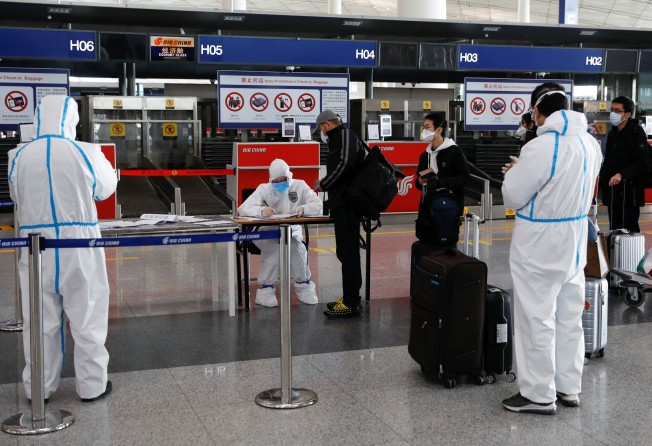China takes a hard line at the border to beat coronavirus imports
- Preventing imported cases ‘top priority’ as criminal charges threatened for travellers who make false health declarations
- As other countries also impose tough border controls, there are calls for global collaboration to save world economy

Travellers to China who refuse medical inspections and make false health declarations at the border face criminal charges as the country steps up its efforts to prevent imported coronavirus infections.
The central government said on Monday that arrivals who were infected, or suspected to be infected, and refused medical and quarantine inspections – or who made false statements about their health on customs declarations – would be convicted.
The document, issued jointly by five authorities, said that any inbound traveller who carried unapproved microorganisms, human tissue, biological products and blood and evaded quarantine inspection would also be subject to criminal charges.
China reported a further drop in the number of daily new infections, with 16 cases on Sunday, but its big cities are facing a daunting task in preventing the virus from being brought in to the country by travellers from overseas, as the disease spreads rapidly around the world.
Of the 16 new cases reported as of Sunday, 12 related to people who had arrived from another country. Their destinations in China included Beijing, Shanghai, and the provinces of Guangdong in the south, Yunnan in the southwest, and Gansu in the northwest.
So far China has reported more than 100 imported cases of the virus, with 11 of the affected travellers found to have given false information, according to calculations by the South China Morning Post.
“Preventing imported cases from abroad has become the top priority among all priorities of the current epidemic prevention and control,” said Mi Feng, National Health Commission spokesman.
Beijing has redirected all international flights from its new Daxing airport in the south to Beijing Capital International Airport in the northwest, and international travellers will be quarantined for 14 days in designated places at their own expense from Monday. They will be transferred to isolated places for medical observation.
“Beijing has taken relevant measures on quarantining inbound travellers, and other local authorities will also adopt corresponding management measures in accordance with actual conditions and laws,” Mi said.
The foreign ministry said on Monday that health checks and quarantine measures would be conducted equally for foreigners and Chinese nationals entering China from abroad.
Police in Beijing said separately that an investigation had been launched after a Chinese woman travelling from the US was alleged to have given false health information to airline staff. The woman, surnamed Li, was reported to be infected on March 13.
Beijing police said she took anti-fever medicine before boarding her flight in the US and did not tell the crew of her health situation, or that of her husband and son who were travelling with her. She is being treated in a Beijing hospital, while her husband and son are in quarantine.
Liu Haitao, an official with the State Immigration Administration, said inbound travellers to China were down 80 per cent on the same time last year, with just 120,000 people arriving each day since the World Health Organisation announced a global pandemic on March 11.
Liu said foreigners made up only one-tenth of inbound travellers, and recommended that Chinese nationals reduced non-essential outbound trips.
While the coronavirus outbreak has started to wane in mainland China, the good news has come at the expense of economic growth. Official statistics showed China’s economy – the world’s second largest – has suffered a heavy blow as industrial output, urban investment and retail sales all contracted sharply to record lows in the first two months of this year.
Other countries are also imposing border controls and other restrictive measures to prevent the contagion, and they have also rushed to announce monetary easing policies in an attempt to shore up market confidence. But experts warned a lack of global collaboration would endanger the world’s supply chain amid an already grim economic outlook.
Lu Xiang, a research fellow in international relations with the Chinese Academy of Social Sciences, said China had to strike a balance between risk control and the resumption of economic activity.
“China has paid a huge cost and cannot afford another blow on top of the virus outbreak. We cannot loosen control for the sake of economic growth,” he said.
Lu said the slow response in Europe and the US, their failure to learn the lessons from China, and continuing global chaos could add to the risks of disruption to the global supply chain, and to the US-China trade deal. He said the economy could be severely hit in the second quarter.
“The shocks from the demand side and supply side would make China’s purchases in the phase one trade deal meaningless,” he said.
“Virus containment needs global coordination. No one is an island entire of itself,” Lu added.
Imogen Page-Jarrett, research analyst for China with The Economist Intelligence Unit, said that while quarantine requirements were likely to deter foreign nationals from coming to China in the short term, they would be beneficial for the overall resumption of economic activity.
“If the government does not quarantine these arrivals, they could cause a fresh outbreak in a major city like Beijing or Shanghai. This would not only require a lockdown of the affected areas, but also damage consumer and business confidence further – something that China cannot afford if it wants to engineer an economic recovery in the second quarter of 2020,” she said.
Purchase the China AI Report 2020 brought to you by SCMP Research and enjoy a 20% discount (original price US$400). This 60-page all new intelligence report gives you first-hand insights and analysis into the latest industry developments and intelligence about China AI. Get exclusive access to our webinars for continuous learning, and interact with China AI executives in live Q&A. Offer valid until 31 March 2020.